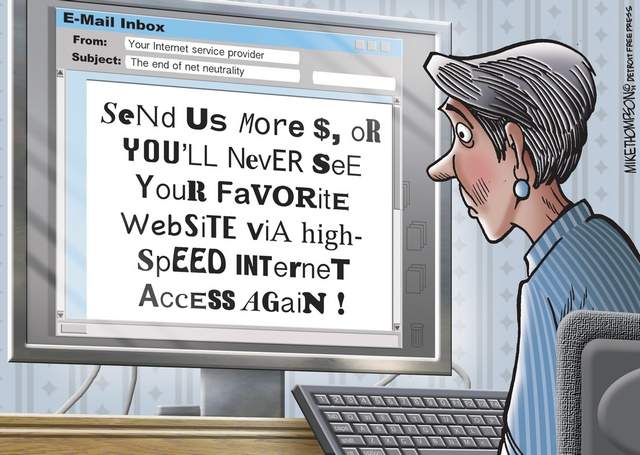[fblike]
 Last Thursday, the Federal Communications Commission (FCC) on a party-line vote decided to reclassify broadband as a telecommunications service. This allows the FCC to impose more regulations on broadband Internet providers as if they were a public utility. The FCC intervened due to concerns that Internet Service Providers (ISPs) will discriminate against network traffic, speeding up some Internet sites that would be willing to pay them a special fee, while reducing the speeds of other sites that either refused to pay or were in competition with other operations of the ISP. This so-called “net neutrality,” which treats all Internet data the same, has become a highly charged political issue, with conservatives warning that the FCC’s decision will stifle innovation and liberals championing the FCC’s decision as a victory for consumer interests.
Last Thursday, the Federal Communications Commission (FCC) on a party-line vote decided to reclassify broadband as a telecommunications service. This allows the FCC to impose more regulations on broadband Internet providers as if they were a public utility. The FCC intervened due to concerns that Internet Service Providers (ISPs) will discriminate against network traffic, speeding up some Internet sites that would be willing to pay them a special fee, while reducing the speeds of other sites that either refused to pay or were in competition with other operations of the ISP. This so-called “net neutrality,” which treats all Internet data the same, has become a highly charged political issue, with conservatives warning that the FCC’s decision will stifle innovation and liberals championing the FCC’s decision as a victory for consumer interests.
This topic brief will discuss the road to the FCC’s recent net neutrality decision, what its regulations will do, and the potential political and legal battles ahead regarding net neutrality. Extempers should read last year’s brief on net neutrality to obtain sufficient background on this issue, as this topic brief will center more on the FCC’s vote.
Readers are also encouraged to use the links below and in the related R&D to bolster their files about this topic.




 Here is today’s premium R&D to accompany
Here is today’s premium R&D to accompany  Since the 1980s, when a deregulatory climate emerged in Washington D.C., American media companies have launched consolidation efforts to buy up smaller competitors to expand market share, taken control of national and local television stations, and merged with telecommunications companies to acquire a share of the nation’s Internet market. The proposed $45.2 billion merger between Comcast and Time Warner Cable, which would combine the nation’s top two cable companies, both of which also provide Internet access, has alarmed consumer advocates that worry it will harm consumers through higher prices and selective access to content. The principle of net neutrality, whereby all Internet content is treated equally by Internet Service Providers (ISPs), was established by the Federal Communications Commission (FCC) in 2010 to ensure that large media conglomerates could not prejudice certain forms of Internet content over others. However, in January a federal appeals court ruled that the FCC had no statutory (lawful) authority to enact those net neutrality rules based on the way that it has classified ISPs. A recent deal that Netflix, a streaming and DVD-based movie distribution service, made with Comcast is seen by consumer watchdog groups as the beginning of a “pay-to-play” Internet where content distributors will be forced to pay ISPs to access their networks or acquire satisfactory Internet speed so that they do not lose existing customers.
Since the 1980s, when a deregulatory climate emerged in Washington D.C., American media companies have launched consolidation efforts to buy up smaller competitors to expand market share, taken control of national and local television stations, and merged with telecommunications companies to acquire a share of the nation’s Internet market. The proposed $45.2 billion merger between Comcast and Time Warner Cable, which would combine the nation’s top two cable companies, both of which also provide Internet access, has alarmed consumer advocates that worry it will harm consumers through higher prices and selective access to content. The principle of net neutrality, whereby all Internet content is treated equally by Internet Service Providers (ISPs), was established by the Federal Communications Commission (FCC) in 2010 to ensure that large media conglomerates could not prejudice certain forms of Internet content over others. However, in January a federal appeals court ruled that the FCC had no statutory (lawful) authority to enact those net neutrality rules based on the way that it has classified ISPs. A recent deal that Netflix, a streaming and DVD-based movie distribution service, made with Comcast is seen by consumer watchdog groups as the beginning of a “pay-to-play” Internet where content distributors will be forced to pay ISPs to access their networks or acquire satisfactory Internet speed so that they do not lose existing customers.